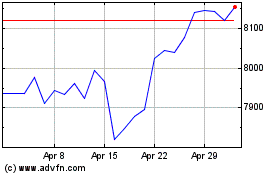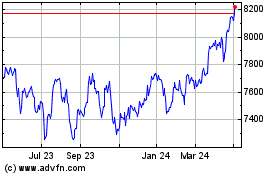LONDON MARKETS: FTSE 100 Gains Ground After Solid U.S. Jobs Report, Heads For Weekly Win
March 09 2018 - 9:31AM
Dow Jones News
By Carla Mozee, MarketWatch
U.K. industrial production slows
U.K. blue-chip stocks pushed modestly higher Friday, gathering
strength alongside U.S. stocks after monthly hiring figures
stateside showed the labor market in the world's largest economy
expanded at a stronger pace than anticipated.
U.K. stocks had earlier been struggling to keep up a run of
wins, as mining shares grappled with the prospect of U.S. tariffs
on steel imports.
How markets are moving
The FTSE 100 index rose 0.2% to 7,220.67 after darting between
small gains and losses earlier in the session. On Thursday, the
benchmark rose 0.6%
(http://www.marketwatch.com/story/european-stocks-rise-for-4th-day-in-a-row-as-ecb-steals-focus-from-us-tariffs-2018-03-08)
and marked a fourth straight day of gains. For the week, the FTSE
100 was on course to rise 2.1%, which would be the first weekly win
in three weeks.
The pound bought $1.3849, up from $1.3812 late Thursday in New
York.
What's driving markets
London-listed shares climbed with U.S. and European stocks after
data showed the U.S. economy added 313,000 new jobs in February
(http://www.marketwatch.com/story/us-adds-313000-jobs-in-february-in-biggest-gain-in-a-year-and-a-half-2018-03-09).
That outstripped expectations of 222,000 in a MarketWatch poll of
economists. February's figure signaled that the U.S. economy has
room to keep expanding. The U.S. is a key business and consumer
market for many London-listed companies.
However, wage growth moderated, and that could tamp down worries
among investors that rising pay will lead to higher inflation and
prompt the Federal Reserve to raise interest rates more than the
market has anticipated.
U.K. stocks had been choppy after largely lackluster U.K.
economic data for January, and after U.S. President Donald Trump
late Thursday signed a decree to impose tariffs of 25% on imported
steel and 10% on aluminum. But Canada and Mexico were exempted from
the levies as the U.S. attempts to renegotiate the North American
Free Trade Agreement.
Read:EU lines up its salvos to fight Trump tariffs
(http://www.marketwatch.com/story/eu-lines-up-its-salvos-to-fight-trump-tariffs-2018-03-08)
"We hope we can get confirmation that the EU is excluded from
this," said European Union Trade Commissioner Cecilia Malmstrom on
Friday at a forum in Brussels. The tariffs will go into effect
March 23. While the EU shares concerns about overcapacity in the
steel market, "this isn't the right way" to deal with the issue,
she said.
See:ECB's Draghi: 'If you put tariffs against your allies, one
wonders who the enemies are'
(http://www.marketwatch.com/story/ecbs-mario-draghi-if-you-put-tariffs-against-your-allies-one-wonders-who-the-enemies-are-2018-03-08)
And check out: EU leader responds to Trump's tariff plan: 'We
can also do stupid'
(http://www.marketwatch.com/story/eu-leader-responds-to-trumps-tariff-plan-we-can-also-do-stupid-2018-03-07)
What strategists are saying
-- "For a labor market that we are told is rather tight this is
quite a big number and the fact that we saw wage growth slow to
2.6% from 2.9% would suggest that there is much more slack in this
particular jobs market than most people think," said Michael
Hewson, chief market analyst at CMC Markets, in a note.
"This would suggest that those calls for four rate rises this
year may well be a little bit premature, particularly when you see
the participation rate jump from 62.7% to 63%, as more people
return to the workforce. This is likely to prompt a little bit of a
brake on the U.S. dollar rebound we've seen this week," he
added.
-- "February's fall in average wage rise data takes some of the
pressure off [the Fed]. But the creation of more than 300,000 jobs
in February suggests it will return in the months to come," said
James Ingram, investment manager at MB Capital, in an note. "Throw
in a potential trade war between the U.S. and the EU and the U.S.
economy could be headed for a perfect inflationary storm later this
year," he added.
Stock movers
Miners shrugged off earlier weakness that came following the
news of the tariffs. Iron ore producers Rio Tinto PLC (RIO) (RIO)
(RIO) and BHP Billiton PLC (BLT.LN) (BHP.AU) (BHP.AU) turned higher
to trade up 0.9% and 1.9%, respectively, and Antofagasta PLC
(ANTO.LN) flipped up to rise 1.6%.
Investec upgraded miners Anglo American PLC (AAL.LN) and
Glencore PLC (GLEN.LN) to buy from hold. Shares were up 1.8% and
0.9%, respectively.
Among companies that have significant revenue exposure to the
U.S., equipment-rental provider Ashtead PLC (AHT.LN) rose 2.1% and
luxury goods maker Burberry Group PLC (BRBY.LN) (BRBY.LN) picked up
1.4%.
GKN PLC (GKN.LN) rose 1.1% after the engineering company reached
a deal to combine its Driveline automobile business with Dana Inc
(http://www.marketwatch.com/story/gkn-merging-auto-unit-in-61-billion-deal-2018-03-09).
(DAN) in a deal valued at about $6.1 billion.
Economic data
U.K. industrial production expanded by 1.3% in January, slightly
slower than an expected 1.5% reading in a FactSet poll of analysts.
The Office for National Statistics said manufacturing production
rose 0.1% in January, marking a ninth consecutive month of
expansion, but that fell somewhat short of expectations of 0.2%
growth. Construction output contracted 3.4% in January.
Meanwhile, the U.K.'s total trade deficit widened by GBP3.4
billion to GBP8.7 billion in the three months to January, driven
largely by a decline in fuel exports and an increase in fuel
imports. Stripping out commodities, the deficit widened by GBP2.6
billion to GBP8.9 billion.
(END) Dow Jones Newswires
March 09, 2018 10:16 ET (15:16 GMT)
Copyright (c) 2018 Dow Jones & Company, Inc.
FTSE 100
Index Chart
From Mar 2024 to Apr 2024

FTSE 100
Index Chart
From Apr 2023 to Apr 2024
